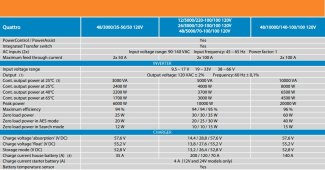The part that bothers me a little is that if you look at their quatro 5000 / 48, that will in fact supply 5000 watts, and more. Not just 5 000 VA.
According to the Victron spec sheet the Quattro 5000 / 12:24:48 will supply 5,000 VA
or 4,000 watts @ 25° C, not 5,000 watts. It supposedly can supply 10,000 watts peak.


So using that as a reference / experience point from the past, now buying a 3000 / xx and it is really a 2400 watt inverter (for similar mixed inductive,etc loads ) , it seems deceptive.
At the same time, the honda generator rating system is also a bit optimistic as well. Try to get 2000 watts out of a honda 2000 and most people will learn that it really is intended to be operated closer to 1100 watts if you want moderate noise levels and reasonable fuel consumption rates.
For people who read closely it isn't an issue, but for the typical average consumer, inverters in general might be the most deceptive / expensive product that they ever try to purchase.
Victron is a true engineering company. They rate in VA because that is the proper way to rate equipment that supplies AC electricity. Go look at the transformer that supplies your house or a Home Depot - they are rated in KVA, not kilowatts.

VA and Watts are both measurements for electrical power. AC loads are much more complex than DC loads because the voltage and current are not always in phase. In a DC circuit voltage and current are always in phase. Apparent power in VA is used to simplify power ratings, which makes it easier to calculate the current draw. Since VA = RMS volts x RMS amps, you divide the VA rating by the RMS voltage to get the RMS current the devices will draw. Knowing the RMS current allows you to properly size wiring and circuit breakers or fuses that supply current to your devices, helping you to create a safe power delivery network.
To calculate VA for AC it is Volts RMS * Amps RMS (VA = E
RMS * I
RMS). For DC it is Volts * Amps. (P=E * I)
To calculate Watts for AC the formula is ∫v(t) * i(t)dt. For DC it is Volts * Amps. (P=E * I)
The differences in the formulas should point out that the calculations required for AC are much more complex than DC. As an engineering company Victron publishes real world specifications for the gear they manufacture. Contrary to your assertion, they are actually one of the very few I see in this market that do not exaggerate their ratings. They are published in industry standard nomenclature - no marketing hype involved. Your observation about the Honda generators is a perfect example of marketing vs reading the specs.
People seem to think that just because they can buy an inverter that it absolves them from reading about and understanding what they are buying / installing / using. Electricity can be dangerous and the current and voltages present in these types of systems can kill people very easily. Forums like this one help the "average person" build systems and such that untrained or uneducated people really have no business messing with. There are legalities and codes for good reasons - to protect people from both the electricity AND from installations done improperly because of lack of knowledge, understanding, training, etc. No knock against the DIY'er - I'm one myself. But I also happen to be an EE, even though that is no longer how I make my living.





